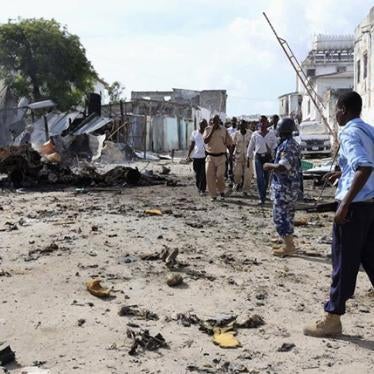(Nairobi) – The Somali government during 2013 failed to address the human rights crisis in the capital, Mogadishu, and elsewhere in the country, Human Rights Watch said today in its World Report 2014.
Despite public pledges and international support, the new government’s inability to bring about concrete improvements in protecting the population exposed lack of both capacity and political will to carry out pressing reforms.
“The Somali government could have used 2013 to act on its reform agenda,” said Leslie Lefkow, Africa deputy director . “There were lots of promises but in practice only backtracking on key commitments to tackle the culture of impunity and end rampant sexual violence.”
In the 667-page world report, its 24th edition, Human Rights Watch reviews human rights practices in more than 90 countries. Syria’s widespread killings of civilians elicited horror but few steps by world leaders to stop it. A reinvigorated doctrine of “responsibility to protect” seems to have prevented some mass atrocities in Africa. Majorities in power in Egypt and other countries have suppressed dissent and minority rights. And Edward Snowden’s revelations about US surveillance programs reverberated around the globe.
The authorities failed to improve the dire situation for Mogadishu’s massive internally displaced population or security in areas newly under the government’s control. At least two women who reported rapewere prosecuted instead of being protected, and while the government developed strong plans for justice, police, and army reform, it did not take meaningful steps to implement them.
Insecurity and threats to civilians remained rife throughout south-central Somalia, including in government-controlled areas, Human Rights Watch said. The armed Islamist group al-Shabaab increased attacks against civilians and civilian structures in Mogadishu. An al-Shabaab suicide bomb attack on the Mogadishu courthouse in April killed at least 30 civilians. Outside the capital, fighting continued. In the regions under al-Shabaab control, the group imposed harsh restrictions on basic rights and carried out targeted killings and executions of people accused of spying.
In January, the government announced plans to relocate within Mogadishu tens of thousands of internally displaced people who are at risk of serious abuse at the hands of government forces, allied militia, and private individuals including camp managers known as “gatekeepers.” These plans stalled due to the government’s inability to provide basic protection in the planned relocation sites.
The government pledged to tackle the alarming levels of sexual violence throughout the country. However, on several occasions, government authorities and members of the security forces undermined these commitments by intimidating people who reported rape, Human Rights Watch found.
The government also had promised to tackle the culture of impunity and lack of accountability for serious human rights abuses, including attacks on journalists, five of whom were killed in 2013. But the government has failed to provide civilian courts with basic security, and relied largely on a military court that has sentenced both government soldiers and civilians following trials that raise due process concerns.
“Somalia’s international supporters say that the country is well on the road to stability,” Lefkow said. “But the government’s inability to provide protection and needed assistance even to communities under its control tells a very different story.”








